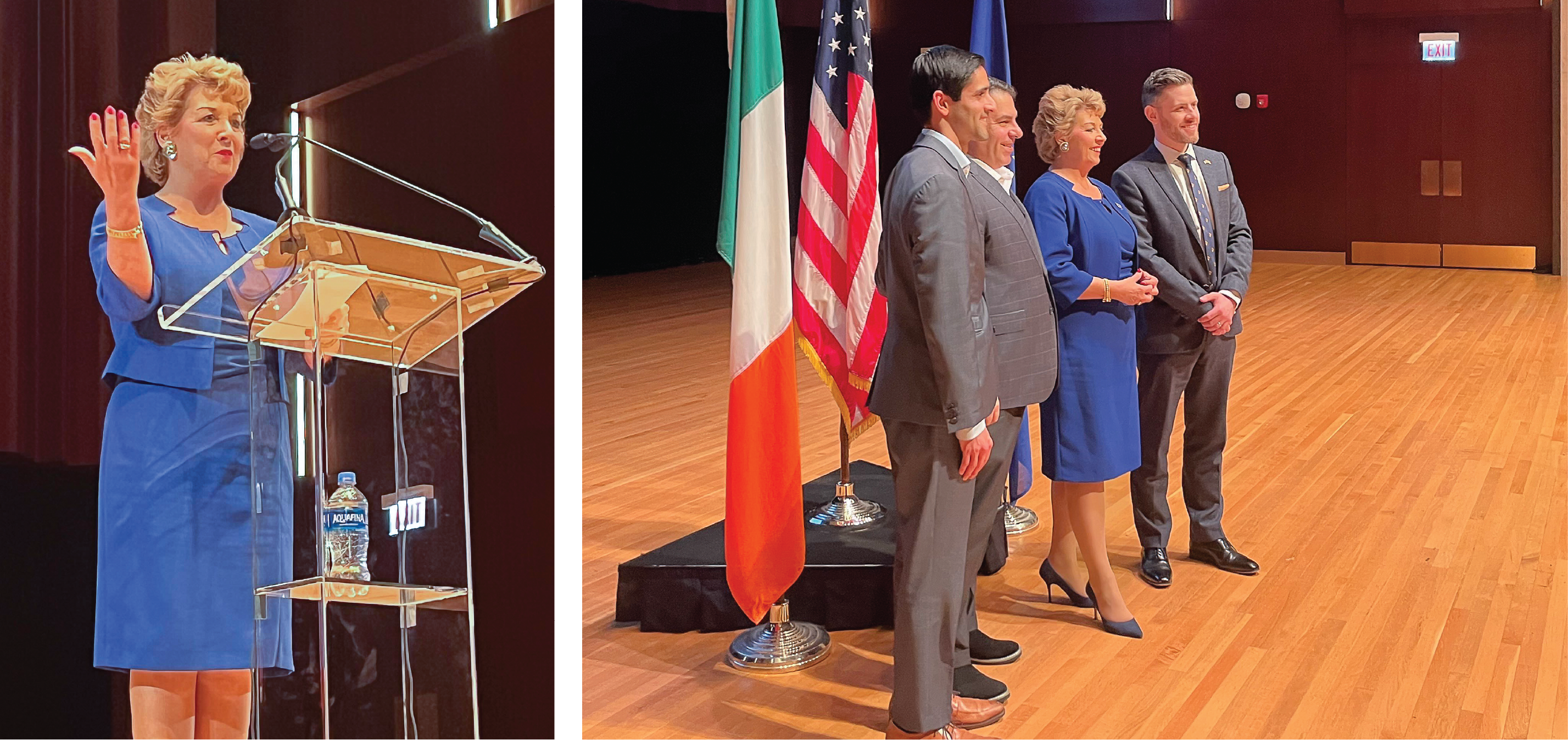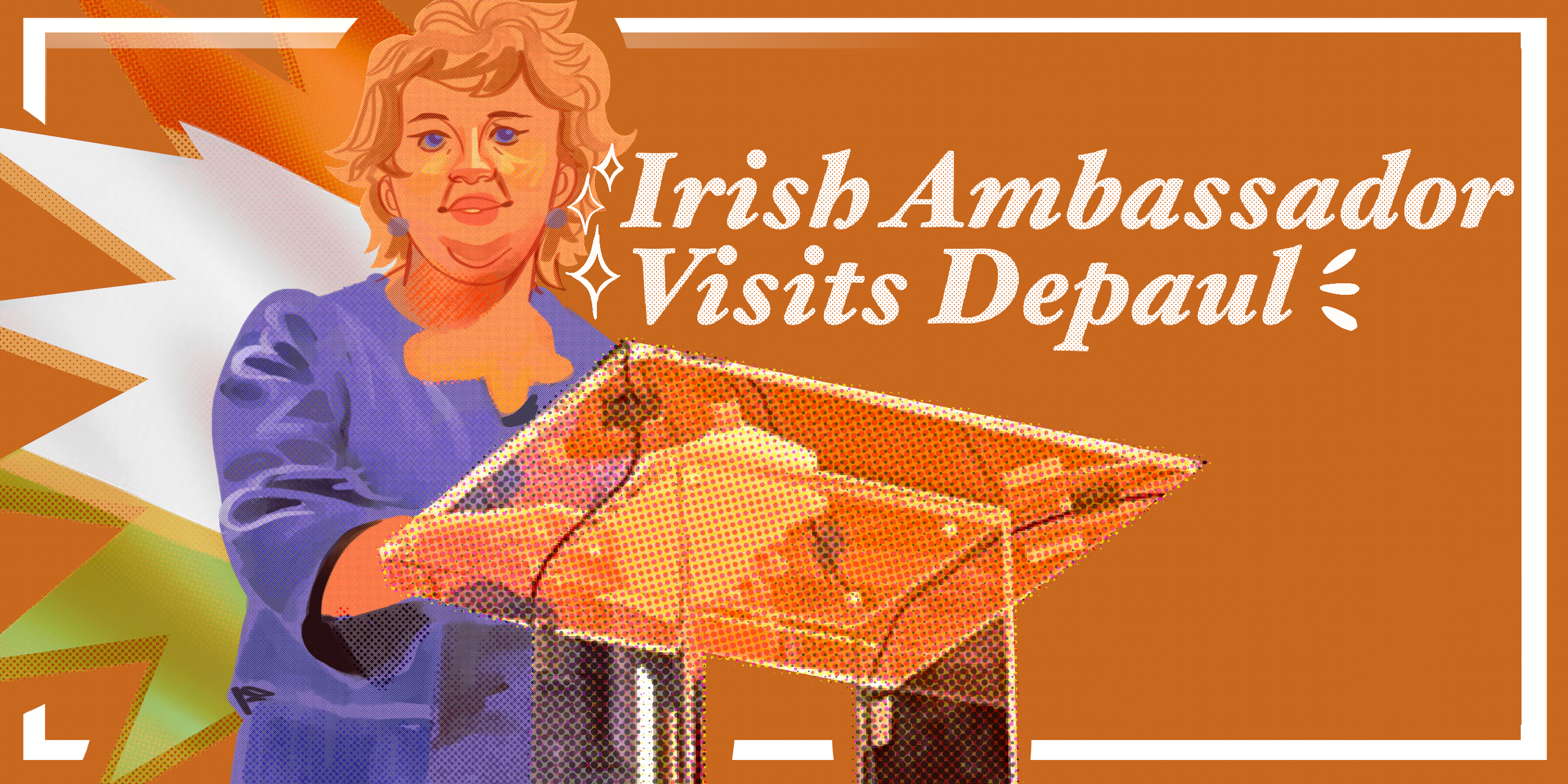Ambassador Geraldine Byrne Nason sits down for a Q&A with 14 East to answer some questions
On April 21, Ireland’s Ambassador to the U.S. Geraldine Byrne Nason visited DePaul’s Holtschneider Center to discuss and celebrate the 25th anniversary of The Good Friday Agreement. DePaul’s Irish Studies Program, in partnership with the Consulate General of Ireland, hosted this event. After the event, 14 East editor Hailey Bosek discussed some of the issues brought up in her speech.
What is the Good Friday Agreement?
This political agreement was signed on April 10, 1998, and was a landmark decision to aid in the ending of the violent sectarian conflict called The Troubles. The Troubles took place in Northern Ireland for about 30 years, from the late 1960s to 1998, and took the lives of 3,500 people. The Good Friday Agreement, otherwise known as The Belfast Agreement, was a multi-party agreement centered around the cooperation of the Protestant and Catholic communities in Northern Ireland. The agreement between the largely Catholic nationalist party and the majority Protestant unionist party provided a hope for reconciliation between the two groups and a stable future.
The Speech
After a short introduction from DePaul’s president, Robert Manuel, and Chicago’s Consul General of Ireland, Kevin Byrne, the ambassador took the stage. She began by giving thanks to DePaul and acknowledging the anniversary of The Good Friday Agreement. Ambassador Byrne Nason noted the significance of such a long-lasting peace agreement in the face of such division.
“I can say without any fear of contradiction, that peace agreements are extremely hard won. There are rare and sustainable peace agreement slogans that stand the test of time, like the 25 years we’ve just seen the Good Friday Agreement—or actually, I would qualify them as miraculous,” Byrne Nason said in the speech.
The ambassador noted that the agreement was forged by compromise. After decades of violence, this compromise was an extremely complicated process that was voted upon by the people of Northern Ireland and the Republic of Ireland.
“It was a vision that wasn’t afraid of compromise. It’s hard to explain that sometimes when enemies come to the table that compromise is needed in a peace agreement. That compromise allowed us to break the cycle of violence that ravaged the island of Ireland,” said Byrne Nason. She explained that the people of the island have been severely affected by this violence, but have been able to provide a better future for the people growing up in Northern Ireland now.
“Thanks to that Good Friday agreement, a whole new generation of young people have been given the freedom to dream big dreams for the first time,” said Bryne Nason.

Ireland’s Ambassador to the U.S. Geraldine Byrne Nason speaks about the Good Friday Agreement to members of the DePaul community at the Holtschneider Center on April 21. Photos by Hailey Bosek, 14 East
This trip from the ambassador comes right after the recent trip President Joe Biden took to the island. The partnership between the two countries has been historically a strong one, and the ambassador noted the U.S.’s involvement in reaching peace.
“I often say that The Good Friday Agreement belongs to the people of Northern Ireland but it was made in America,” said Ambassador Byrne Nason.
The ambassador also noted the relationship between Chicago and Ireland. She told the crowd how she had grown up hearing about the Irish community in Chicago.
Professor Mary McCain, the director of the Irish Studies Program, was a major factor in getting the ambassador to deliver a speech at DePaul.
“It’s such a huge honor, I still am sort of pinching myself, that it occurred. And I must say how grateful I am to the consulate, for coming to us with this suggestion, with this opportunity, and to so many entities and portions of DePaul that made it possible,” said McCain.
McCain also feels that the Irish community in Chicago is strong and feels that many people in Chicago hold tight to their Irish ancestry.
“Chicago has deep connections to previous generations of Irish immigrants, their descendants, many of whom still live in the city or its surrounding metropolitan area,” McCain said. “There’s a lot more to the Irish American community in Chicago than St. Patrick’s Day.”
However, despite the success of The Good Friday Agreement, there are still lingering problems that the ambassador mentioned. The lasting problems of tensions and segregation persist in Northern Ireland, causing distance between the existing groups. The ambassador explained that while it is not a perfect peace, there is progress to be celebrated.
“It still has problems and has yet to live off I would say the full promise of the Good Friday Agreement. But it’s unquestionably, unquestionably, a much better place than it was,” said the ambassador.
The ambassador noted other obstacles that Northern Ireland is facing. She spoke about how the country is dealing with the influx of almost 75,000 Ukrainian refugees. However, she noted a most pressing issue of the absence of a functioning government since February 2022 due to the Democratic Unionist Party refusing to meet over arguments about Brexit.
“I’m now hoping, really hoping, that we move to a point where the political leaders will take the path that is necessary, and that will lead them back to restore those institutions,” said Byrne Nason.
The restoration of these institutions is not an easy task. The compromise of The Good Friday Agreement made it so that the people of Northern Ireland could take a vote to return back to the Republic, making a united Ireland. After the ambassador’s speech, she answered questions from the crowd. One attendee asked her if she believed in a future with a united Ireland. After noting the difficulty of the question for a diplomat to answer, she noted that these changes would not be an easy one, but the very conversation happening allows supporters to hope for a united Ireland.
“I want to see a united Ireland, but it’s not something that’s going to happen overnight. It’s a very complex process, to consider, basically, what that would look like,” said the ambassador.
After the speech, she spoke with students and took pictures. She then sat down for a Q&A with 14 East.
McCain felt the ambassador handled the questions well and handled the difficult topic thoughtfully.
“The ambassador presented a very balanced look at the topic as a whole,” said McCain.
Header Illustration by MJ White




NO COMMENT